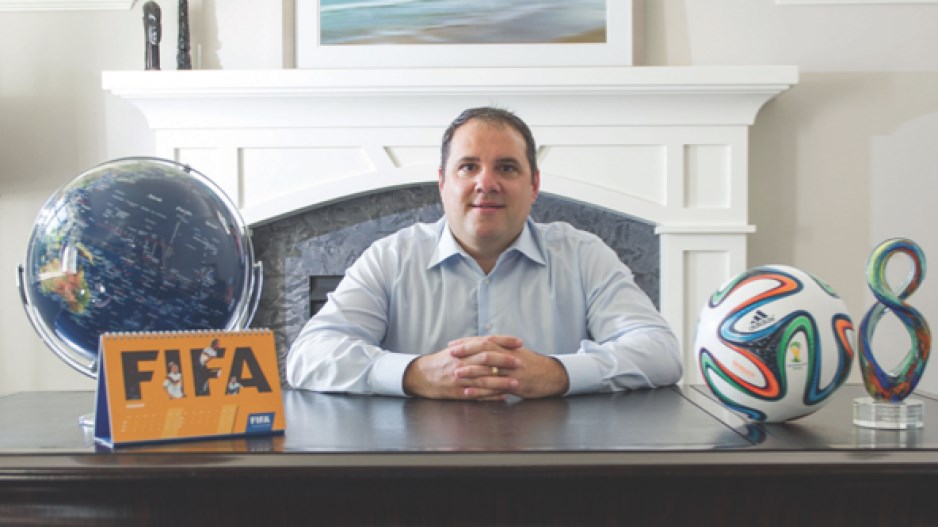Victor Montagliani's ambition to host the 2026 FIFA World Cup in Canada could be the ultimate combination of his two business pursuits: insurance and soccer.
North America hasn't hosted since World Cup USA 1994. Canada has a blossoming soccer culture and a reputation as a reliable host of major events, says the Canadian Soccer Association (CSA) president. Canada qualified but once, for Mexico 1986, so hosting would mean insurance by automatic entry against the quadrennial disappointment endured by Canadian soccer fans.
Canada's men's team is a lowly 122nd in the latest FIFA rankings, but FIFA's most recent Big Count in 2006 ranked Canada as the 22nd- biggest soccer nation, with nearly 2.7 million players, of which 865,000 are registered.
Canadians also love to watch the game: Germany's 1-0 extra-time win over Argentina in the Brazil 2014 final on CBC peaked at 11.3 million viewers.
FIFA hasn't announced the 2026 bidding process, and the CSA will need to marshal support from governments and corporations for a formal bid. For now, Montagliani, 49, is focused on organizing the biggest women's sporting event in history: the 24-nation, six-city 2015 Women's World Cup, which will culminate at BC Place stadium next July 5.
Canada became host by default, when Zimbabwe withdrew its bid in 2011. A year later, Canada's Christine Sinclair-captained national team came home from the London 2012 Olympics with bronze medals. That was also the year that Montagliani was elected CSA president and became a senior vice-president with Shaw Sabey and Associates after nine years as outsource risk manager at Hub International.
The East Vancouver-raised son of immigrants from Celano, Italy, said he was “born into the game ... but fell into” the insurance business. The Templeton secondary graduate grew up playing for Grandview Legion and later joined Columbus FC, the semi-pro club recognized in 2013 by the Canadian Soccer Hall of Fame for cultivating numerous national team members.
Montagliani also played internationally in the late 1980s for Canada in futsal, the international version of indoor soccer.
After his 1988 graduation with political science and French degrees from Simon Fraser University, Montagliani considered law school. In 1990, he responded to an ad for Guardian Insurance Co. He spent two years training there before going to work for Hogan and Cox. He said the tenacity learned on the soccer pitch helped shape his insurance career.
“I've been able to take those values that the game teaches you, knowing that you need to do that not in isolation but with your teammates as a collective. I've been able to take that into a corporate environment,” Montagliani said. “Creating an environment where there's harmony, laughter and camaraderie is as important as working together.”
BC Soccer Association's president from 2003 to 2005, Montagliani was elected a CSA vice-president in 2006 and became president in 2012 on a reform agenda.
“The CSA, in a lot of ways, was an organization that didn't have a corporate element to it; it was run in a very – and I use this word loosely – non-profit way, in terms of attitude. I've been able to bring more of a corporate mentality, corporate structure in the boardroom to how we run things. I've done that not in isolation, I've done that with the board.”
Montagliani is also on FIFA's legal committee and the executive board for Concacaf, the governing body for association socceer in North America, Central America and the Caribbean. His knowledge of Italian, French and Spanish has come in handy at international meetings.
Concacaf was ground zero for bribery scandals that have tarnished the image of FIFA under its embattled president, Sepp Blatter.
Former Concacaf president Jack Warner and general secretary Chuck Blazer gained the attention of FBI investigators. Warner played a pivotal role in the controversial awarding of the 2022 World Cup to Qatar, the oil- and gas-rich state with a population smaller than Vancouver's.
“The previous regime in Concacaf had committees, never met,” Montagliani said. “From a governance perspective, when you have finance committees and all those committees that never meet, the first thing you lose is the oversight ability of an organization on operations. That doesn't happen anymore.”
Montagliani calls father Luciano, 78, his biggest influence and his wife and two daughters his biggest, most patient supporters. He points to FIFA general secretary Jérôme Valcke, U.S. Soccer Federation (USSF) president Sunil Gulati and Concacaf president Jeffrey Webb as inspirations.
Under Montagliani, the CSA has a simple one-page strategic plan – the previous ones were thick, bureaucratic mumbo-jumbo. The organization's budget fluctuates from $20 million to $22 million, depending on the year. (Unlike the USSF, CSA does not publish its finances.) Montagliani said the CSA has built a $5 million reserve, which is useful for investing in the future through high-performance, teen development programs.
“Our skill set as Canadians in administration and governance is high, not just in soccer, but any aspect. We need to learn how to transform that into success on the pitch. That's our next challenge.”
Qualifying for the Russia 2018 men's World Cup is more than a year away, but that isn't the CSA's sole focus.
“It's not a popular thing, because our fans want it now, but for the first time in our history we're looking at it that way. Whereas before we looked at it in a four-year cycle, and that's the wrong way to run an organization.”
Montagliani's first order of business is ensuring June and July 2015 meet the expectations of FIFA and that Sinclair and her teammates have the best chance possible to play for the prize at BC Place.




